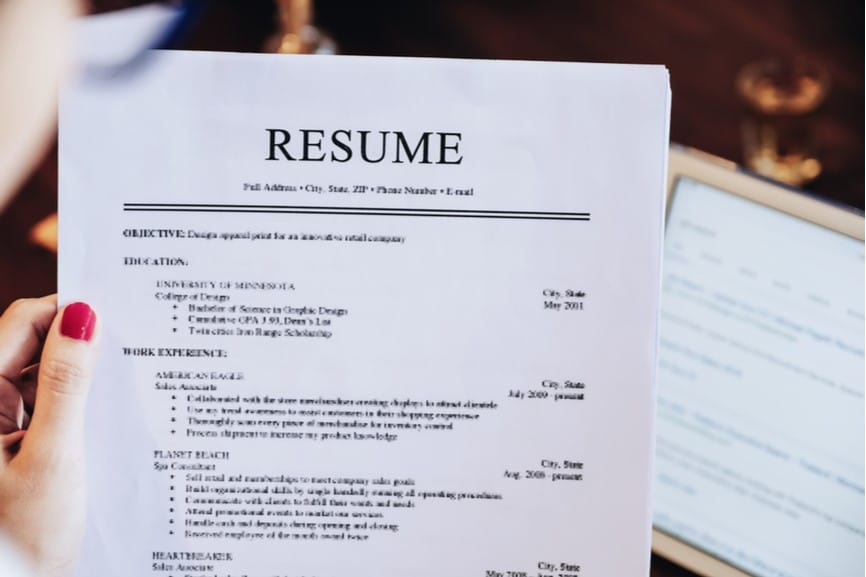Looking for a full-time job?
When you are looking for a full-time job, creating an updated, attractive, and straight-to-the-point resume maker is one of the most responsible and tedious stages of the process.
However, if we could give you one piece of advice, it would be to stick to the ‘’quality over quantity’’ principle. Recruiting experts spend hours scrutinizing dozens of candidates’ CVs. They neither have the time nor the ability to assess all the skills you mention.
Thus, may your resume be brief, but make it stand out from others. Candidates with cumbersome resumes are unlikely to impress recruiters. Try to focus on the most sought-after top-notch skills instead.
Other candidates
Candidates don’t have to brag about their talents or accomplishments where it is inappropriate. There are many other situations where your inspiring stories unrelated to the job will be welcome (btw, job interviews can be such a situation).
Yet, our resumes must be short and sweet, making their owners shine bright among the rest of the applicants.
Specialists from Jooble, a leading job search engine worldwide, have prepared some instances of skills that candidates should leave off their CVs.
Foreign languages you poorly possess
Mentioning a foreign language in your resume means by default that you can freely build cohesive and meaningful sentences and express your thoughts using it. If not, rather cross it out and concentrate on the things you do well.
You don’t have to be too shy. Speaking a foreign language doesn’t mean you should reach a native speaker level.
If your Spanish or German is approximately B1-B1 (according to the international classification), it is an impressive result you should mention in the resume.
Remember that any foreign language is a tool helping you bridge with colleagues and clients. It works only if you use it, and you use it when you know it.
Let’s keep in mind that the interviewers can check your knowledge. If your level of the foreign language doesn’t meet their expectations, they can consider the whole CV made up. So, don’t take this risk.
Being a social media pro without the necessary knowledge
Having social media accounts and a basic understanding of opinion exchange there doesn’t make you an expert in this field. Although many of us have profiles on Facebook, Instagram, or Twitter, and we should know what to use when something is not working, a great tool will be a VPN or simply using sites with the help of proxy servers for a better and safer connection and so on.
To understand how social media platforms work, you need a solid background in targeting or running online stores, etc. Personal brands are gaining popularity and this tendency shows no signs of decline.
Thus, working on your social media representation can become a big advantage when you apply for a job. Yet, let’s keep in mind a substantial difference between managing your account for fun and doing it for a company’s needs.
Social media specialists are well-familiar with data analysis, determination of the target audience, paid ads campaign etc. This sphere is more demanding and complicated than one might think of it.
If you are sure about your knowledge, don’t hesitate to mention the relevant experience you had with social media channels. However, we would recommend emphasizing that you dealt with it on a case basis, not regularly.
Pointing all soft skills you know, not possess
Candidates’ soft skills are always of great interest to recruiters and potential employers. They play a crucial role in the resume. To present soft skills in the most professional way, jobseekers should select them carefully.
Nowadays, everyone is a good communicator, eager problem-solver, and stress-resistant motivated employee. It is getting mainstream and recruiters tend to buy such statements less.
But what if you are a great communicator indeed?
What if you really can work well under pressure and know how to pull yourself together when it’s needed the most? In this case, we would recommend describing these soft skills in detail.
For example, tell a short story when you manage to show your most prominent skills. You found a common ground with a very tough client and ultimately, convinced him to buy more products or services.
Or, let’s say, you turned out to be faster than your competitors and launched a successful project under better circumstances. Invite people to see your biography through such stories.
By giving clear (and honest!) examples when your soft skills helped you out, you will increase your chances to get a job.
To sum up, our resumes should be brief and straight-to-the-point documents where we explain why we are the most fitting candidates for a particular job. While preparing the resume, follow the rule ‘’quality over quantity’’.
Recruiters don’t have time to process tons of information candidates tend to put in the CV. So, instead of listing everything you have ever done or learned, focus on the most sought-after skills.
Include only relevant information, don’t brag about things you barely know. You have to be ready to defend any statement written in the resume. Don’t be afraid, to be honest.
Avoid controversial information and create a cohesive and clear image of yourself as a professional.
